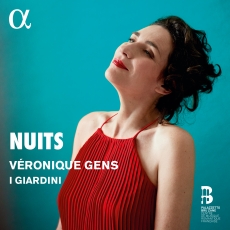Véronique Gens - Nuits - Gramophone
A co-production between Alpha and Palazzetto Bru Zane, Véronique Gens’s ‘Nuits’ is basically a recital of mélodies for soprano and piano quintet, much of which consists of arrangements by Alexandre Dratwicki for the same forces as Chausson’s experimental Chanson perpétuelle – the only work here specifically written for this particular combination of performers, though Guillaume Lekeu also adopted it for the revised version of his ravishing ‘Nocturne’, originally with piano. The aim, Dratwicki tells us in his booklet note, is to ‘expand the repertory for voice, strings and piano’ by ‘harking back to the art of transcription so dear to the 19th century’, and to offer ‘an original reading of well known pieces, and bring to light some forgotten gems’. Whether the disc ideally succeeds, however, is debatable.
The programme, focusing on the idea of ‘nocturnal abandon’, is fancifully divided into four sections, dealing with twilight, exotic or orientalist fantasy, reveries and nightmares, and love affairs, clandestine or otherwise, all of which certainly affords us insight into its composers’ preoccupations, though too few of Dratwicki’s arrangements shed fresh light on either the music itself or the milieu in which it was written. Some of them can be affective in their own right. Saint-Saëns’s ‘Désir de l’orient’ began life as a tenor aria in La princesse jaune, and Dratwicki cleverly adds the japonaiserie allegro from the opera’s overture as a postlude. ‘La dernière valse’ from Hahn’s 1925 Une revue is all elegant cabaret nostalgia, while Ropartz’s ‘Ceux qui, parmi les morts d’amour’ has a morbid, bittersweet beauty. Elsewhere, however, Dratwicki’s interventions can be obtrusive. Pizzicato strings add nothing to the brittle, percussive piano accompaniment of Massenet’s ‘Nuit d’Espagne’ and Berlioz’s ‘L’île inconnue’ loses much of its magic when reworked for chamber ensemble.
As one might expect, however, everything is beautifully and fastidiously done. Gens is in fine voice here, caressing phrases and words with all her customary refinement. Chanson perpétuelle, reflective yet intense, then suddenly searing at its climax, gets one of its finest performances on disc, while the Lekeu is a model of sensual understatement, superbly sustained. Piaf’s ‘La vie en rose’ sounds altogether too polite, though ‘J’ai deux amants’ from Messager’s L’amour masqué is delicious in its knowing, erotic wit. I Giardini are excellent, too, really coming into their own in the instrumental pieces that punctuate the disc. La Tombelle’s Orientale, originally for piano four hands, is gracefully sensuous, while their cellist Pauline Buet and pianist David Violi give a stark, uncompromising account of Liszt’s own transcription of his second version of ‘La lugubre gondole’. It will probably leave you in two minds but is worth hearing for Gens singing Chausson and Lekeu above all.

